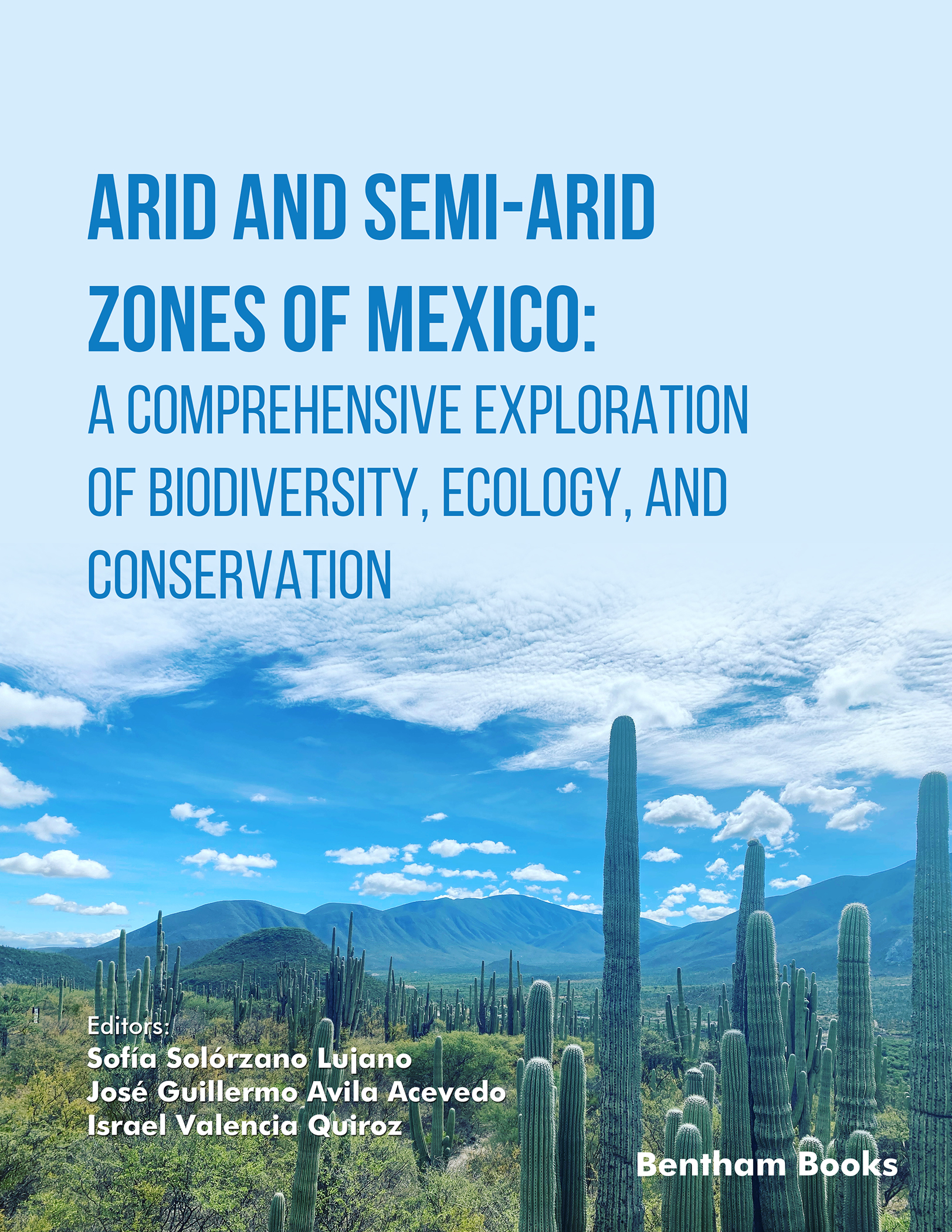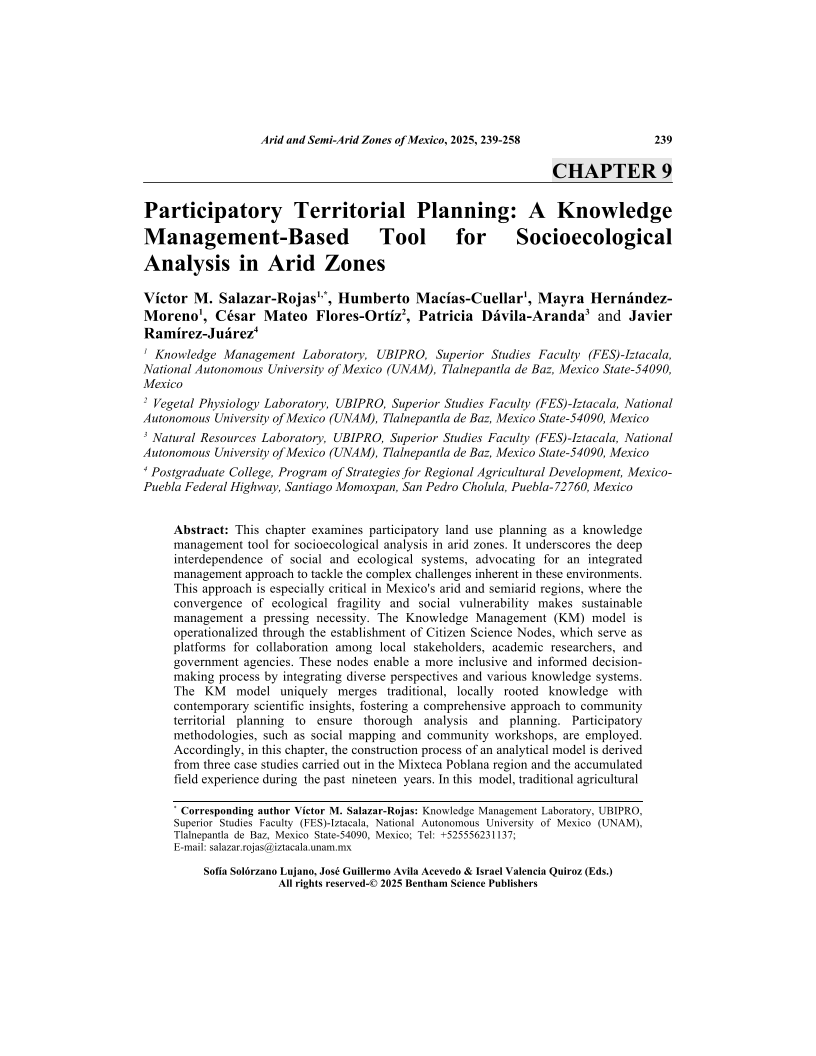Participatory Territorial Planning: A Knowledge Management-Based Tool for Socioecological Analysis in Arid Zones

- Authors: Víctor M. Salazar Rojas1, Humberto Macías-Cuellar2, Mayra Hernández-Moreno3, César Mateo Flores-Ortíz4, Patricia Dávila-Aranda5, Javier Ramírez-Juárez6
-
View Affiliations Hide Affiliations1 Knowledge Management Laboratory, UBIPRO, Superior Studies Faculty (FES)-Iztacala, National Autonomous University of Mexico (UNAM), Tlalnepantla de Baz, Mexico State-54090, Mexico 2 Knowledge Management Laboratory, UBIPRO, Superior Studies Faculty (FES)-Iztacala, National Autonomous University of Mexico (UNAM), Tlalnepantla de Baz, Mexico State-54090, Mexico 3 Knowledge Management Laboratory, UBIPRO, Superior Studies Faculty (FES)-Iztacala, National Autonomous University of Mexico (UNAM), Tlalnepantla de Baz, Mexico State-54090, Mexico 4 Vegetal Physiology Laboratory, UBIPRO, Superior Studies Faculty (FES)-Iztacala, National Autonomous University of Mexico (UNAM), Tlalnepantla de Baz, Mexico State-54090, Mexico 5 Natural Resources Laboratory, UBIPRO, Superior Studies Faculty (FES)-Iztacala, National Autonomous University of Mexico (UNAM), Tlalnepantla de Baz, Mexico State-54090, Mexico 6 Postgraduate College, Program of Strategies for Regional Agricultural Development, MexicoPuebla Federal Highway, Santiago Momoxpan, San Pedro Cholula, Puebla-72760, Mexico
- Source: Arid and Semi-Arid Zones of Mexico: A Comprehensive Exploration of Biodiversity, Ecology, and Conservation , pp 239-258
- Publication Date: June 2025
- Language: English
Participatory Territorial Planning: A Knowledge Management-Based Tool for Socioecological Analysis in Arid Zones, Page 1 of 1
< Previous page | Next page > /docserver/preview/fulltext/9789815322460/chapter-9-1.gif
This chapter examines participatory land use planning as a knowledge management tool for socioecological analysis in arid zones. It underscores the deep interdependence of social and ecological systems, advocating for an integrated management approach to tackle the complex challenges inherent in these environments. This approach is especially critical in Mexico's arid and semiarid regions, where the convergence of ecological fragility and social vulnerability makes sustainable management a pressing necessity. The Knowledge Management (KM) model is operationalized through the establishment of Citizen Science Nodes, which serve as platforms for collaboration among local stakeholders, academic researchers, and government agencies. These nodes enable a more inclusive and informed decisionmaking process by integrating diverse perspectives and various knowledge systems. The KM model uniquely merges traditional, locally rooted knowledge with contemporary scientific insights, fostering a comprehensive approach to community territorial planning to ensure thorough analysis and planning. Participatory methodologies, such as social mapping and community workshops, are employed. Accordingly, in this chapter, the construction process of an analytical model is derived from three case studies carried out in the Mixteca Poblana region and the accumulated field experience during the past nineteen years. In this model, traditional agricultural practices and ancestral knowledge are key factors in achieving ecological sustainability. Additionally, this chapter addresses modern challenges such as urbanization and globalization, which have a significant impact on the resilience of complex socioecological systems. The main findings suggest that integrating a socioecological approach with effective knowledge management not only strengthens community participation but also enhances resilience, offering a highly adaptable framework for sustainable natural resource management in arid zones.
-
From This Site
/content/books/9789815322460.chapter-9dcterms_subject,pub_keyword-contentType:Journal -contentType:Figure -contentType:Table -contentType:SupplementaryData105

